Both California Spangled Cat and Viverral are originated from United States. Both California Spangled Cat and Viverral are having almost same weight. Both California Spangled Cat and Viverral has same life span. Both California Spangled Cat and Viverral has same litter size. California Spangled Cat requires Moderate Maintenance. But Viverral requires Low Maintenance
Basic Information
undefined
United States
United States
Life Span:
10 - 15 Years
10 - 15 Years
Colors Available:
silver, Mix of colors such as black, red and white with a mix of different shaped spots, tan
Cream, black, tan - spots
Coat:
Short and fairly soft
Short and plush
Temperament:
Affectionate, Alert, Cheerful, Curious, Energetic, Friendly, Independent, Intelligent, Lively, Loving, Loyal, Outgoing, Playful, Responsive, Social, Territorial
Affectionate, Aggressive, Alert, Cheerful, Curious, Energetic, Friendly, Independent, Intelligent, Lively, Loving, Loyal, Outgoing, Playful, Responsive, Social, Stubborn, Territorial
Grooming:
Moderate Maintenance
Low Maintenance
New Owners Friendly:
Yes
Yes
History
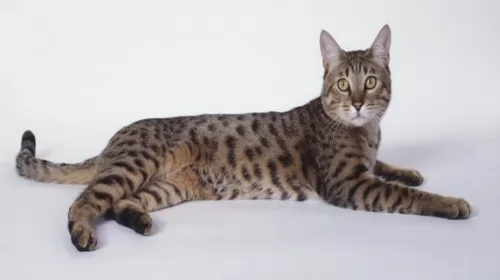 People seem to want a cat that resembles some of the wild cats we have, and the California Spangled is a domestic cat that has been bred to resemble spotted wild cats.
People seem to want a cat that resembles some of the wild cats we have, and the California Spangled is a domestic cat that has been bred to resemble spotted wild cats.
In fact, it was during the 1970s, that Paul Casey, an American scientist, returned from Tanzania to create a cat breed that resembled a wild cat such as a leopard.
There are many breeds that make up the California Spangled cat and these are the Abyssinian, British Shorthair, Siamese as well as some stray cats. Today, the breed has all but disappeared and there are only a few of the cats left.
This is a rare cat breed and therefore not much information on it is available.
It does seem that in 2002, a 5th generation Viverral was developed and this established the breed.
The cat is described as a fishing cat hybrid. A breeding program was started but it is thought that the cat became extinct.
Description
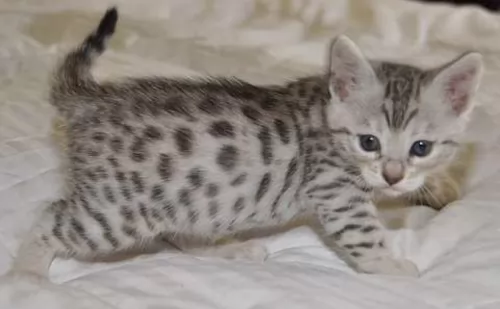 The California Spangled cat is lean with a long muscular body and long legs. Its long body makes it look like it is on the prowl like a leopard.
The California Spangled cat is lean with a long muscular body and long legs. Its long body makes it look like it is on the prowl like a leopard.
Its coat, similar to that of a leopard, can be a mix of colors such as black, tan, silver, red and white with a mix of different shaped spots. The coat is fairly short and doesn’t require too much grooming. However, a brush will be like a bonding session for you and your cat and it will keep his coat shiny and free of loose hairs and dust.
The cat has almond-shaped eyes that are amber to copper-colored.
Temperament:
This cat is independent but it still wants to get a lot of attention from his owners. They’re affectionate, social and devoted to their human family. They are known for their intelligence and high energy levels, enjoying games that involve lots of action and participation.
Being an active cat, it needs a lot of space to roam and to play. Because he is smart, buy him interesting toys, a scratching post, and climbing equipment.
The Viverral is muscular and substantial. He has a smallish head and smallish ears with a thick tail.
The coat is spotted. The base color of the coat and the spots should be different. The light cream underbelly is also spotted.
Large, muscular, and solid, the cat’s eyes are big and round in the smallish heald. The coat is short and plush with a spotted pattern of black, brown or tan spots.
Temperament:
The Viverral cat has been designed to produce friendly kittens that are curious and confident. They turn out strong and confident and are suitable as house cats.
New cat owners might have success with them and they can even be friendly with children in the home, but the truth remains, they are unpredictable.
Beautiful and something unique, it is not likely though that this cat breed would have wanted to be cuddled and petted by his human owners.
Characteristics
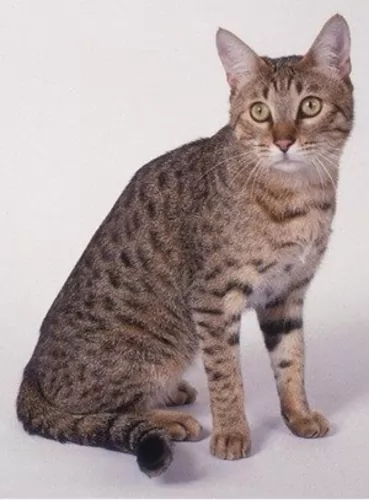 These active but calm cats are very sociable, liking to talk to only when needed and then the meow of the cat is soft.
These active but calm cats are very sociable, liking to talk to only when needed and then the meow of the cat is soft.
While this cat would prefer being the only cat in the family, they are quite adaptable in the right environment and will adapt to a home where there are other pets.
These are cats that enjoy being the only cat in the house, but they are prepared to adapt to a life shared wth other cats or dogs.
They love playing and will respond well to children who have been taught how to be kind to animals.
They’re pricey cats these but they can certainly provide you with 15 years of great companionship.
Hybrid cats such as the Viverral can look quite a bit like a wild cat and this is what first appeals to cat lovers. They want an exotic cat to brag about.
However, these cats can come up with a whole lot of behavioral problems so that you wish you had never got one. One should just go along to some of the many cat shelters there are to discover how many hybrid cats land up there.
They turned out to be a disappointment – their behavior wouldn’t conform to what their human family expected of them. This is the story of hybrid cats. Humans want some exotic looking animal to please their greedy natures and then when the cats don’t behave the way they should, they get rid of them. Rather, it is humans that need to change their behavior and leave wild animals alone.
The Viverral can have their good side and be splendid pets but they aren’t consistent. They have a streak of unpredictability, and they also have issues with the use of a litter box.
They mark their territory too and can show some aggression. Any animal with a wild side isn’t going to make the best pet, but still, some cat lovers have managed to bring out their best side.
Health Problems
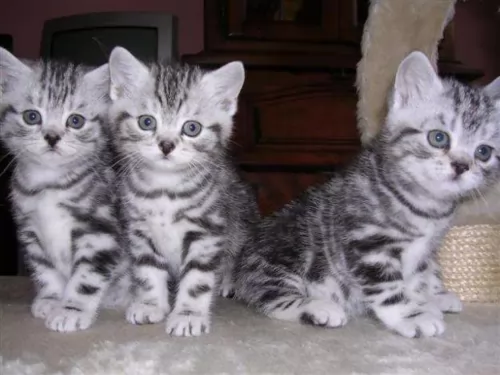 This cat is healthy without any hereditary health issues, and with good care he can reach 15 years of age.
This cat is healthy without any hereditary health issues, and with good care he can reach 15 years of age.
It always helps to choose a reputable breeder to minimize health risks. When in any kind of doubt as to the wellbeing of your cat, rather speak to your vet to be sure.
The development of hybrid cats began as a scientific effort in the 1970s. Hybrid pets can be aggressive and also solitary.
Hybrid cats are an unnatural breeding. They are cat species that weren’t meant to mate in the first place. Breeders tell stories of premature births and also aborted pregnancies.
Some of the more common illnesses among hybrid cats include digestive issues. Also, vaccinations used to protect our domestic cats from disease have not been approved for use in hybrid animals.
A hybrid cat has a wild side to him. These cats were bred to look like a wild cat, and although they are healthy, they can also have some health issues.
Ensuring the cat has a proper diet will contribute more to better health. As mentioned, some of these cats can battle with the likes of chronic diarrhea and irritable bowel disease and also battle with intestinal parasite issues.
Caring The Pet
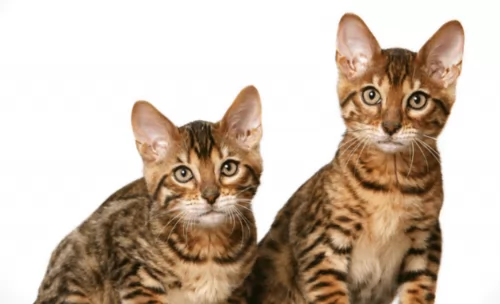 When it comes to feeding these cats, you’ll find that the California Spangled Cat is highly energetic and therefore his food needs to be of the very best high protein that there is.
When it comes to feeding these cats, you’ll find that the California Spangled Cat is highly energetic and therefore his food needs to be of the very best high protein that there is.
The cat requires high-quality food and food that is adapted to his growth and energy levels. If your California Spangled Cat had to hunt for his own food it would be mice and birds - protein.
In your home, he’ll need cat food high in protein. A diet deficient in protein can lead to all kinds of health issues. The reason for this is the protein has amino acids and this plays many essential roles in the body, strengthening the immune system.
Fortunately, in our busy world, commercially manufactured cat foods from top brands are nutritionally complete and balanced, and they’re high-protein cat foods. Proteins are imperative for the functioning of all body parts, and nursing queens for instance may well need more protein to get the kittens off to a good start.
Grooming:
Your California Spangled cat isn’t a huge shedder so a regular brushing once a week of the short coat will get rid of dust and loose hairs.
They’re playful cats these so provide them with games and toys that can help with using up some of this energy.
These are different cats to your regular domestic cat, and they will require different care. One of the things you need to do for a cat like this is provide it with an outdoor enclosure.
Because of their wild side, they are longing to be outdoors and you may find it difficult integrating such a cat into your home.
The Viverral needs plenty of exercise but you can’t just let them roam freely outdoors. Yes, you can train them to walk with a leash but you need to allow him outside in the enclosure. You can include a shallow paddling pool for him too.
These are active, intelligent cats and you will need to invest in some interactive toys for him to keep him amused.
You will need to supply this cat with a scratching post and a climbing tree. This is because as a cat, he is a natural climber and scratcher and he will need these in his life.
Ensure your feline pet has a nice warm, dry place to sleep.
Comparison with other breeds
- California Spangled Cat vs Abyssinian - Breed Comparison
- California Spangled Cat vs Aegean - Breed Comparison
- California Spangled Cat vs African Serval - Breed Comparison
- California Spangled Cat vs Chausie - Breed Comparison
- California Spangled Cat vs American Bobtail - Breed Comparison
- California Spangled Cat vs American Curl - Breed Comparison
- California Spangled Cat vs American Keuda - Breed Comparison
- California Spangled Cat vs American Longhair - Breed Comparison
- California Spangled Cat vs American Polydactyl - Breed Comparison
- California Spangled Cat vs American Shorthair - Breed Comparison
- California Spangled Cat vs American Wirehair - Breed Comparison
- California Spangled Cat vs Applehead Siamese - Breed Comparison
- California Spangled Cat vs Ashera - Breed Comparison
- California Spangled Cat vs Asian - Breed Comparison
- California Spangled Cat vs Asian Semi-Longhair - Breed Comparison
- California Spangled Cat vs Australian Mist - Breed Comparison
- California Spangled Cat vs Balinese - Breed Comparison
- California Spangled Cat vs Bengal - Breed Comparison
- California Spangled Cat vs Bicolor - Breed Comparison
- California Spangled Cat vs Birman - Breed Comparison
- California Spangled Cat vs Blue Russian - Breed Comparison
- California Spangled Cat vs Bombay - Breed Comparison
- California Spangled Cat vs Brazilian Shorthair - Breed Comparison
- California Spangled Cat vs Bristol - Breed Comparison
- California Spangled Cat vs British Longhair - Breed Comparison
- Viverral vs Abyssinian - Breed Comparison
- Viverral vs Aegean - Breed Comparison
- Viverral vs African Serval - Breed Comparison
- Viverral vs Chausie - Breed Comparison
- Viverral vs American Bobtail - Breed Comparison
- Viverral vs American Curl - Breed Comparison
- Viverral vs American Keuda - Breed Comparison
- Viverral vs American Longhair - Breed Comparison
- Viverral vs American Polydactyl - Breed Comparison
- Viverral vs American Shorthair - Breed Comparison
- Viverral vs American Wirehair - Breed Comparison
- Viverral vs Applehead Siamese - Breed Comparison
- Viverral vs Ashera - Breed Comparison
- Viverral vs Asian - Breed Comparison
- Viverral vs Asian Semi-Longhair - Breed Comparison
- Viverral vs Australian Mist - Breed Comparison
- Viverral vs Balinese - Breed Comparison
- Viverral vs Bengal - Breed Comparison
- Viverral vs Bicolor - Breed Comparison
- Viverral vs Birman - Breed Comparison
- Viverral vs Blue Russian - Breed Comparison
- Viverral vs Bombay - Breed Comparison
- Viverral vs Brazilian Shorthair - Breed Comparison
- Viverral vs Bristol - Breed Comparison
- Viverral vs British Longhair - Breed Comparison
 Petzlover
Petzlover People seem to want a cat that resembles some of the wild cats we have, and the California Spangled is a domestic cat that has been bred to resemble spotted wild cats.
People seem to want a cat that resembles some of the wild cats we have, and the California Spangled is a domestic cat that has been bred to resemble spotted wild cats. The California Spangled cat is lean with a long muscular body and long legs. Its long body makes it look like it is on the prowl like a leopard.
The California Spangled cat is lean with a long muscular body and long legs. Its long body makes it look like it is on the prowl like a leopard. These active but calm cats are very sociable, liking to talk to only when needed and then the meow of the cat is soft.
These active but calm cats are very sociable, liking to talk to only when needed and then the meow of the cat is soft. When it comes to feeding these cats, you’ll find that the California Spangled Cat is highly energetic and therefore his food needs to be of the very best high protein that there is.
When it comes to feeding these cats, you’ll find that the California Spangled Cat is highly energetic and therefore his food needs to be of the very best high protein that there is.